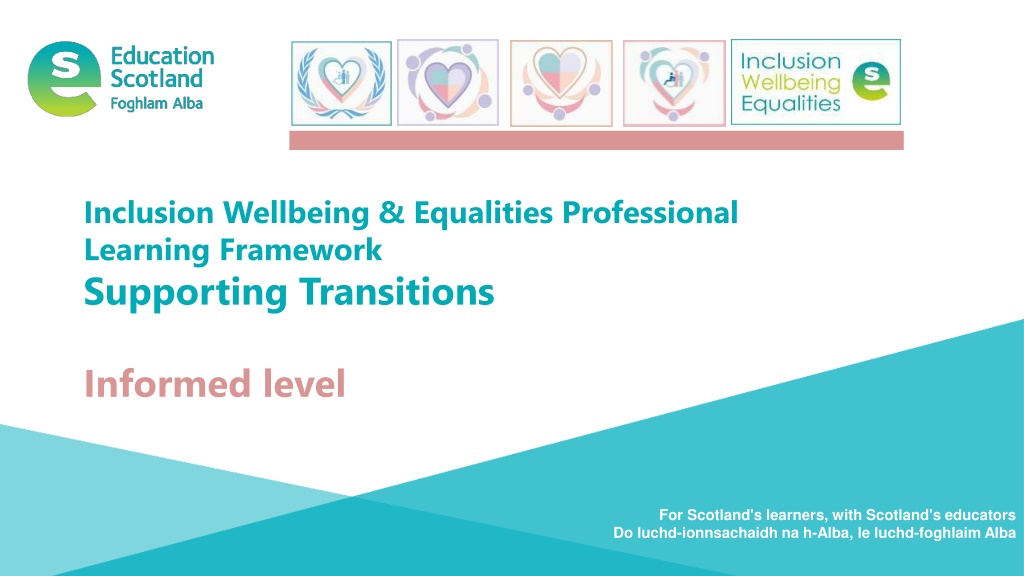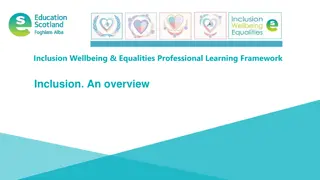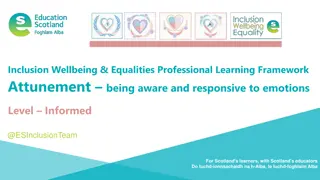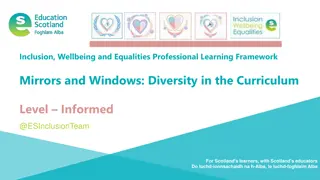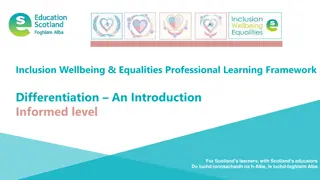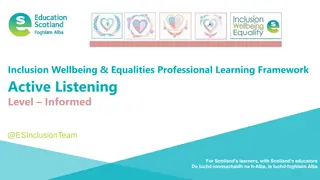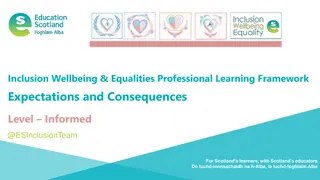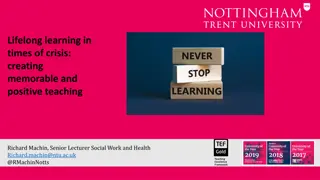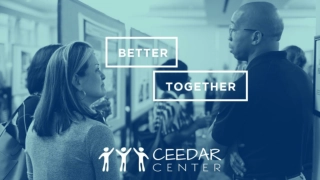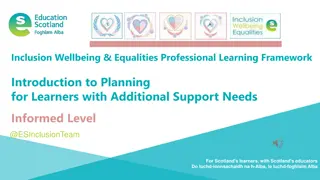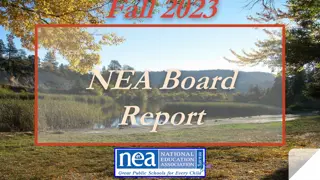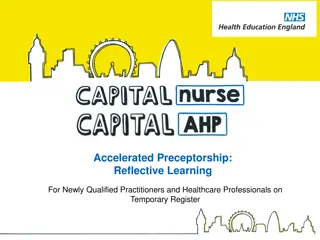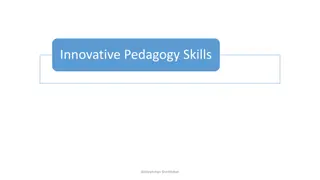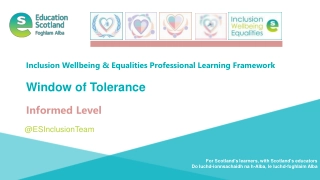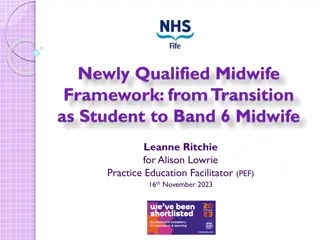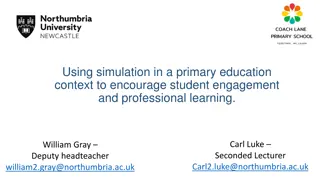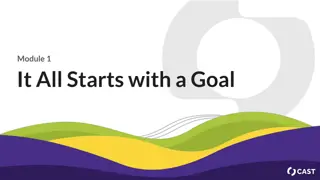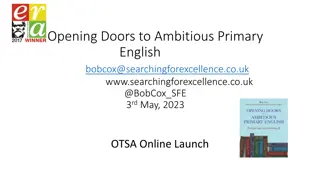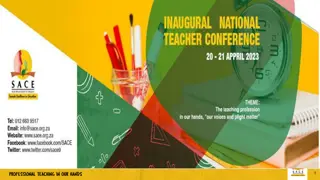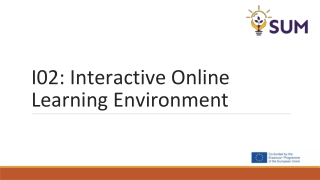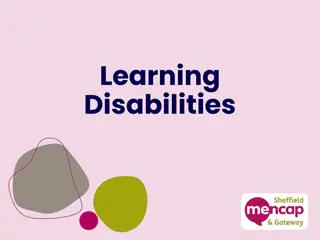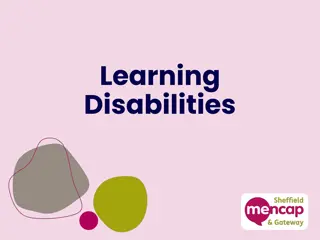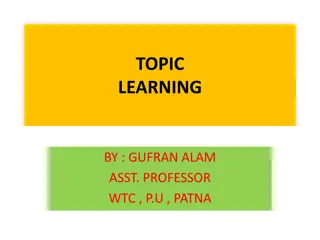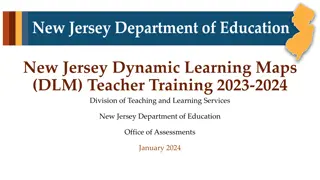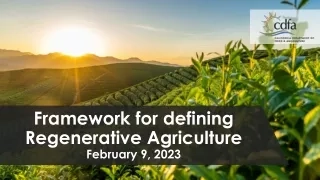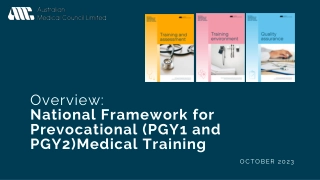Professional Learning Framework for Scotland's Educators
This professional learning framework provides support for Scotland's educators to enhance their knowledge and understanding of inclusion, wellbeing, equalities, and supporting transitions for learners. It includes valuable resources, facilitation notes, and opportunities for reflection and discussion on effective approaches to transitions and engaging parents and carers in the process.
Download Presentation
Please find below an Image/Link to download the presentation.
The content on the website is provided AS IS for your information and personal use only. It may not be sold, licensed, or shared on other websites without obtaining consent from the author. Download presentation by click this link. If you encounter any issues during the download, it is possible that the publisher has removed the file from their server.
Presentation Transcript
Inclusion Wellbeing & Equalities Professional Learning Framework Supporting Transitions Informed level For Scotland's learners, with Scotland's educators Do luchd-ionnsachaidh na h-Alba, le luchd-foghlaim Alba For Scotland's learners, with Scotland's educators Do luchd-ionnsachaidh na h-Alba, le luchd-foghlaim Alba
Interconnectivity For Scotland's learners, with Scotland's educators Do luchd-ionnsachaidh na h-Alba, le luchd-foghlaim Alba
How to use this resource These slides can be used to facilitate professional learning in a group or whole-setting, or as a self-directed learning activity as an individual. Facilitation notes are included at the bottom of each slide. Please do not remove or change any of the slides included. Facilitators are welcome to add slides or activities relevant to your own setting, to support discussion and exploration of the topic. Facilitators will know their participants needs best. Anyone who works in an educational setting can be a facilitator and use these slides. For reflection or discussion activities, it is important to establish a safe space which encourages respect and honesty to ensure that everyone is able to participate. For Scotland's learners, with Scotland's educators Do luchd-ionnsachaidh na h-Alba, le luchd-foghlaim Alba
National Model for Professional Learning This professional learning resource will support you to deepen your knowledge and understanding. You will have the opportunity to consider how to take this learning forward on your own and with others. The National Model of Professional Learning (education.gov.scot) For Scotland's learners, with Scotland's educators Do luchd-ionnsachaidh na h-Alba, le luchd-foghlaim Alba
Welcome This session aims to provide an opportunity to reflect on: The different types of transition children and young people may experience Responsibilities for education settings Effective approaches to ensure transitions are well supported Ways to engage parents and carers in the process For Scotland's learners, with Scotland's educators Do luchd-ionnsachaidh na h-Alba, le luchd-foghlaim Alba
What are transitions? Year to year, within a familiar establishment Between establishments, e.g. ELC to Primary, or Primary to Secondary Throughout the school day Leaving school and moving into adulthood Life stage transitions, e.g. puberty, bereavement, moving house For Scotland's learners, with Scotland's educators Do luchd-ionnsachaidh na h-Alba, le luchd-foghlaim Alba
Responsibilities for education settings There are six points in the education of a child/young person with additional support needs when transition duties apply: pre-nursery pre-primary 1 pre-secondary 1 when leaving secondary education where a pupil is moving to another school within an education authority where a pupil is moving to a school outwith an education authority For Scotland's learners, with Scotland's educators Do luchd-ionnsachaidh na h-Alba, le luchd-foghlaim Alba
Personal transitions Development of personal interests Physical development from small child to adolescent to adult Moving home Making and changing friendships Loss and bereavement Divorce/separation of parents New family members Stepfamilies Starting or moving school Leaving school (post- school) Parents /carers new job may involve working away from home or new shift patterns For Scotland's learners, with Scotland's educators Do luchd-ionnsachaidh na h-Alba, le luchd-foghlaim Alba
Family engagement Family engagement should include: Welcoming in their child s learning community Support to participate in and contribute to their child s learning journey Respecting and including their views Opportunities and support to be involved in the decision-making process of the school, for example, parent participation groups, parent councils, consultation on school/local authority policies and guidelines For Scotland's learners, with Scotland's educators Do luchd-ionnsachaidh na h-Alba, le luchd-foghlaim Alba
Principles for supporting transitions at all stages Give adequate planning time for larger transitions Engage with families at all stages Effective information sharing Practice and prepare children and young people for new situations and environments Change one thing at a time Use developmentally relevant visual supports Look out for signs of anxiety and dysregulation Keep supports in place if they are working In the day to day, limit the number of transitions where possible Transfer successful strategies to new environments For Scotland's learners, with Scotland's educators Do luchd-ionnsachaidh na h-Alba, le luchd-foghlaim Alba
School day transitions When supporting transitions (large and small), it is important to anticipate and plan ahead for the support required for individuals coping with change or with new experiences. Things to consider: Visual schedules or timetables Timers Social Stories Change one thing at a time Provide predictability For Scotland's learners, with Scotland's educators Do luchd-ionnsachaidh na h-Alba, le luchd-foghlaim Alba
Transition planning to support a school move Familiarity with the new school environment and routines through visual supports can make a new school transition easier. Here are some ideas to support: Offer the family and the learner a tour of the building and classrooms Provide a floor plan of the school and label relevant rooms Provide photos of relevant areas. i.e. playground, classroom, cloakroom, hall etc. Provide photos of teaching and office staff Provide the family with a copy of the school handbook link to web page, school app (as age appropriate) Provide a checklist of school routines. The family may tape inside bag/folder/homeschool diary or have a copy at home somewhere easy to see Let family know what the new school uniform/PE clothing requirements are Ensure all staff who will be in contact with the learner are aware of the strengths, development needs and interests of the child. For Scotland's learners, with Scotland's educators Do luchd-ionnsachaidh na h-Alba, le luchd-foghlaim Alba
Transition from Home to ELC Things to consider: Provide opportunities for the parents/carers to share their understanding of their child Ensure parent and carers have appropriate opportunities to be involved in planning Create a book with pictures of school staff and activity areas to share with child and parents Consider the sensory and environmental impact the early years setting may have. Help the child to understand routine by using objects of reference that travel from one activity to another Provide clear signals to mark different points in their routine beginning or end of an activity/task might involve a song which begins the activity each time and a countdown to finish. Visual supports also help a child to recognise and follow routines. For example, a sand timer or buzzer could be used to help mark the end of an activity; sign finish or show a symbol. Be aware of the range of choices available for the child; if there are too many, it may be hard for the child to make any choices. For Scotland's learners, with Scotland's educators Do luchd-ionnsachaidh na h-Alba, le luchd-foghlaim Alba
Transition from ELC to Primary one Things to consider: Talk to parents as early as possible. Familiarise yourself with the child s early years file Build in time for liaison with all of the staff and agencies involved Set up an agreed communication system with parents and other agencies Consult with staff who previously worked with the child Find out what the child really likes Provide copies of the school visual timetable for home Remember you and other staff in the primary school may be strangers to the child and relationships of trust, respect and security needs to be built Within the transition planning explore how to support the child with the new routines which occur in primary school for example: Cloakroom routines Following instructions such as where to sit on the carpet Lunch arrangements End of the day. o o o o For Scotland's learners, with Scotland's educators Do luchd-ionnsachaidh na h-Alba, le luchd-foghlaim Alba
Transition from class to class Things to consider Teachers and support staff should be aware of the learner s support needs and profile The environmental layout in different classrooms can have a positive and negative impact on the individual learner. Consider giving a 5-minute warning prior to the end of class to prepare for the transition. Giving time to pack up and transition from one class to another a few minutes earlier than others Gradually build up time in noisier areas. Where the learner has more than one teacher communication between the learner s teachers is important. Effective communication between pupil support /support for learning and class teachers is also vital. For Scotland's learners, with Scotland's educators Do luchd-ionnsachaidh na h-Alba, le luchd-foghlaim Alba
Transition from Primary to Secondary school The transition from primary to secondary school is a major change in a young person s life but can be even more challenging for learners with additional support needs. It involves a large number of changes which may include: Dealing with a much larger number of pupils Dealing with an increase in the number of classes and subjects Different travel arrangement to get to and from school Being the youngest at the new school More teachers and their different approaches A new and often much larger building New timetables New and different routines Coping with subjects they have not encountered before A longer working day, taking into account travel time. For Scotland's learners, with Scotland's educators Do luchd-ionnsachaidh na h-Alba, le luchd-foghlaim Alba
Transition from Primary to Secondary school continued Things to consider: Families and learners should be part of the planning process and transition meetings Enhanced transition might involve extra visits to the secondary school Transitions should be planned well in advance It is crucial that all agencies work together to ensure a smooth transition Staff in secondary schools should be made aware of learners with additional support needs and have access to learner profiles The lead professional in the transition process should draw up a transition plan detailing learner strengths and areas where additional support may be required. Ensure that the transition plan is appropriately broken down into small, manageable steps if needed For Scotland's learners, with Scotland's educators Do luchd-ionnsachaidh na h-Alba, le luchd-foghlaim Alba
Transition from Primary to Secondary school continued More things to consider: Timetables Navigating the school building Sharing learning outcomes Transitioning between classes Coping with the unexpected For Scotland's learners, with Scotland's educators Do luchd-ionnsachaidh na h-Alba, le luchd-foghlaim Alba
Transition to adulthood Many young people with additional support needs and their families will benefit from support when transitioning to adult life, whether this is from school to college or employment or from child to adult support services. The level and type of support required will vary from one individual to the next, but may involve assistance to: Find and secure employment, educational placements or training Navigate welfare and housing systems Manage personal healthcare needs For Scotland's learners, with Scotland's educators Do luchd-ionnsachaidh na h-Alba, le luchd-foghlaim Alba
Principles of Good Transitions The Scottish Transitions Forum s Principles of Good Transitions 3 (2019) provides a guidance framework for services working collaboratively to plan for young people with a disability aged 14- 25 who are moving into adult life. Seven Principles of Good Transitions are identified: 1. Planning and decision making should be carried out in a person-centred way 2. Support should be coordinated cross all services 3. Planning should start early and continue up to age 25 4. All young people should get the support they need 5. Young people, parents and carers must have access to the information they need 6. Families and carers need support 7. A continued focus on transitions throughout Scotland For Scotland's learners, with Scotland's educators Do luchd-ionnsachaidh na h-Alba, le luchd-foghlaim Alba
Reflection From what you have learned so far, think about: How has this made you feel? What has this made you think about? What one action would you like to take forward? How can you link what you plan to do with others in your setting? How you will know that this learning has made a difference? For Scotland's learners, with Scotland's educators Do luchd-ionnsachaidh na h-Alba, le luchd-foghlaim Alba
We value your feedback From now until March 2024 we will be taking feedback on these resources so that we can make changes in advance of a formal launch of the Professional Learning Framework in June 2024 Your feedback could help us improve this resource Please complete this short form, using the link or QR code, to let us know what you thought of it and any suggestions you have on how it could be improved LINK: https://forms.office.com/e/b5PCpJJJ3P For Scotland's learners, with Scotland's educators Do luchd-ionnsachaidh na h-Alba, le luchd-foghlaim Alba
Education Scotland Denholm House Almondvale Business Park Almondvale Way Livingston EH54 6GA T +44 (0)131 244 5000 E enquiries@educationscotland.gsi.gov.uk For Scotland's learners, with Scotland's educators Do luchd-ionnsachaidh na h-Alba, le luchd-foghlaim Alba For Scotland's learners, with Scotland's educators Do luchd-ionnsachaidh na h-Alba, le luchd-foghlaim Alba
